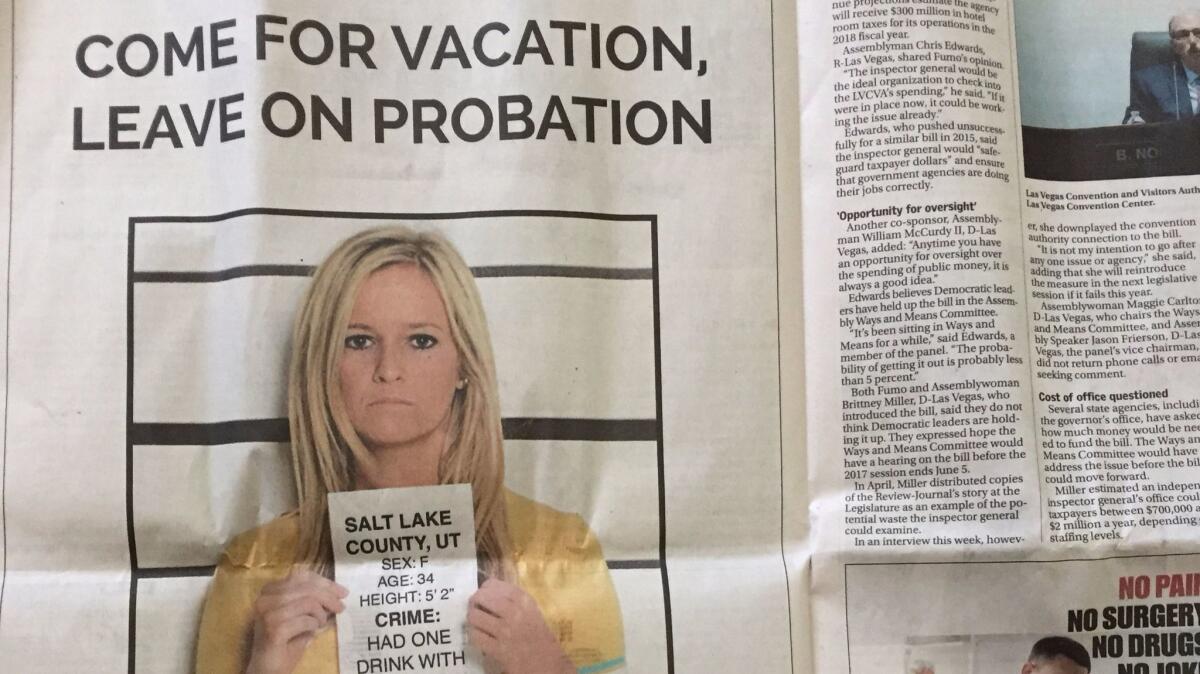Liquor lobbying group declares war on Utah with ad campaign in neighboring states over strict drunk driving law
- Share via
As the summer tourism season kicked off this Memorial Day weekend, Utah found itself under attack — with no immediate reprieve in sight.
The American Beverage Institute launched a full-page ad in Nevada’s largest newspaper last week depicting a woman’s mug shot with the words, “Utah: Come for vacation, leave on probation,” printed in bold lettering above her.
It follows a similar ad run in neighboring Idaho a few weeks ago and one within Utah this spring. Managing Director Sarah Longwell said the group isn’t done either. More ads are coming — targeting tourists in neighboring states and hoping to make potential travelers think twice before visiting Utah.
All because Utah Gov. Gary Herbert signed into law the nation’s toughest drunk driving standard, lowering the legal blood alcohol level from 0.08% to 0.05%.
“Our ad isn’t provocative,” Longwell said. “It’s the truth. What they are doing is provocative.”
Utah has always had a complicated relationship with liquor — largely due to a sizable population that belongs to a religion that forbids alcohol consumption and has its headquarters in Salt Lake City. More than half of the state belongs to the Church of Jesus Christ of Latter-day Saints, and alcohol isn’t a part of Mormon culture.
But the state is also home to iconic national parks, snowboarding and skiing at world-class destinations such as Alta, Snowbird and Solitude. Park City hosts the Sundance Film Festival annually. The state boasts several craft breweries and high-end distilleries.
In Salt Lake City, Temple Square draws people from all over the world and people can still utilize some Winter Olympics sites from when the city hosted the Games in 2002.
All of this adds up to a tourism industry that brings in $8.1 billion to the state each year.
Utah Office of Tourism Director Vicki Varela said the drunk driving law has put the office into explanatory mode, trying to balance the desire for safe highways while luring the tourist dollars.
“The governor sought my feedback and I told him we want people to be safe on the roads,” Varela said. “I was also transparent with our governor.”
She said she told Herbert that whenever Utah makes a change in its liquor laws — especially a dramatic policy shift like 0.05, — the state will get national headlines.
Varela said her agency has “to acknowledge it [the ad campaign] could have some impact. There is no question.” She said as much as 40% of Utah’s visitors come from neighboring states.

Herbert’s office was deluged with phone calls and emails before he signed the measure into law in March. But the law doesn’t take effect until December 2018 and the governor has indicated he’d like to see some tweaks to it — something that could be handled in a special legislative session this fall or even in the 2018 regular session. However, no special session has been called yet.
Herbert spokesman Paul Edwards said one of the things that’s been discussed is a graduated penalty system in which an impaired person testing between 0.05% and 0.07% would be charged with an infraction, whereas 0.08% would be the felony drunk driving limit.
“The governor has made very clear there are some unintended consequences from this decision that need to be further refined,” Edwards said. “However, I don’t think the 0.05% limit is in jeopardy.”
The bill’s sponsor, state Rep. Norman Thurston, said he didn’t want to see a tiered penalty system — or any changes to the core bill. He said 0.05% is a standard already used by some countries in Europe and notes that the National Transportation Safety Board recommended that standard in 2013.
One of the NTSB report’s findings showed that in Queensland, Australia, fatal crashes decreased by 18% after it was lowered from 0.08% to 0.05%.
Thurston, a Provo Republican, said that “this is not an alcohol bill, it’s a driving bill” and that any tinkering with the law shouldn’t change his intent to keep roadways free of drunk drivers. He said he is open, however, to changing one provision of the law that had an unintended consequence — and to do with drunk driving.
State law prohibits carrying a gun while drunk — using the state’s legal DUI standard. This alarmed some gun groups. Thurston said he would be open to changing the law to keep the 0.08% standard for a person carrying a firearm.
He said he also remained optimistic the American Beverage Institute’s ad campaign wouldn’t hurt tourism.
“It’s just a big puff of smoke,” Thurston said. “Part of me thinks there is no such thing as bad press. So, go ahead and spend money on putting Utah out there.”
Similar laws have been attempted in Hawaii and Washington, but both fizzled. Longwell fears a slippery slope, with other states trying to follow Utah’s lead.
According to the Centers for Disease Control and Prevention, Utah had the lowest rate of drunk driving deaths — 1.2 per 100,000 people. Neighboring Nevada’s was 2.8 while California’s was 2.0. The worst state was North Dakota at 11.3 deaths per 100,000 people.
The law passed the Utah House 48 to 26 and had a closer vote in the Senate, 17 to 12. While it was awaiting Herbert’s signature, thousands of calls, emails and letters were sent to the governor’s office — a majority asking for a veto by more than a 9-1 ratio.
Michele Corigliano, executive director of the Salt Lake Area Restaurant Assn., said the group had opposed the bill when it came out. She planned to testify at a committee hearing in June in favor of making driving with a level of 0.05% to 0.07% an infraction rather than a DUI.
She also said the group would back an attempt to repeal the law if that came up in the 2018 legislative session — though Thurston said a repeal is unlikely given the backing the bill had with legislative leadership.
“We got a lot of bad press, but I think the Utah legislators understand the original law that was passed is a little egregious,” Corigliano said. “We continue to work with the legislators to adjust what the law will end up looking like.”
Twitter: @davemontero
MORE NATIONAL NEWS
‘You’re just there, trapped’: Why one Mexican woman decided to ‘self-deport,’ long before Trump
Chicago was the only major U.S. city to lose population from 2015 to 2016
Portland praises its heroes after fatal stabbing
More to Read
Sign up for Essential California
The most important California stories and recommendations in your inbox every morning.
You may occasionally receive promotional content from the Los Angeles Times.











